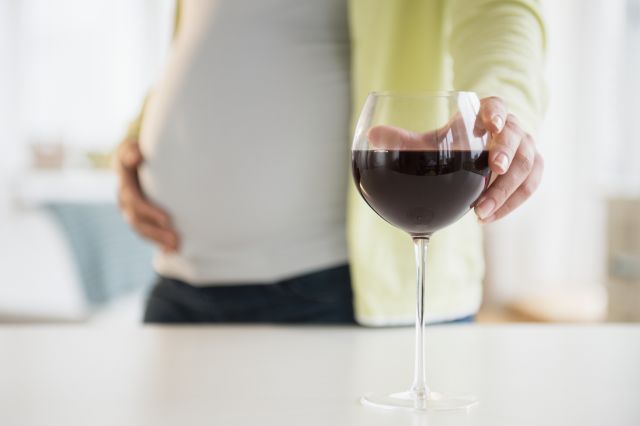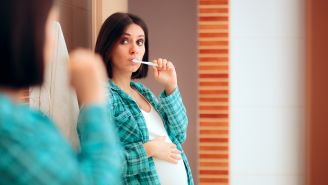Updated on March 21, 2024.
Pregnancy can be a period of different emotions—excitement about starting or expanding your family, anxiety about how to handle all the changes that are about to happen, and many other feelings. Whatever your mood, whether celebratory, stressed, or somewhere in between, there are times when half a glass of wine or a sip of beer might be tempting. The question may arise: Is any alcohol okay when you’re pregnant?
Experts caution that there is no single threshold for how much alcohol is considered safe during pregnancy. The US Centers for Disease Control and Prevention (CDC) says there is no known safe amount of alcohol during pregnancy or while trying to get pregnant. The American College of Obstetrics and Gynecology says it’s best not to drink at all when pregnant, and the American Academy of Pediatrics (AAP) says no amount of alcohol consumption is safe during any time during pregnancy.
How drinking alcohol affects the fetus
When you drink alcohol, it passes to your fetus through the placenta (the organ that develops during pregnancy to support and nourish the fetus) and umbilical cord (which contains blood vessels and connects the placenta to the fetus). So, in effect, your fetus drinks too. Alcohol can interfere in the development of the brain and other organs. It can also cause miscarriage, still-birth or life-long disabilities. According to the AAP, prenatal exposure to alcohol is the top preventable cause of congenital differences and intellectual and neurological developmental disabilities in children.
Fetal alcohol spectrum disorders, or FASD, refers to the group of differences that may develop in the children of those who drink during pregnancy, and can range from mild to severe. However, fetal alcohol syndrome (the most severe subset of FASD) may result from even small quantities of alcohol consumption.
A 2018 study in the Journal of the American Medical Association suggests FASD could affect between 3.1 and 9.9 percent of U.S. children—up to ten times more common than previously thought. To reach their conclusions, researchers evaluated more than 6,600 first graders for FASD in four communities across the US; their mothers were interviewed, as well. The authors found that 222 of the children had FASD. But, just two of them were diagnosed before the study, suggesting the many cases of the condition are not being recognized or reported.
Furthermore, alcohol does not contribute to the increased nutritional demands of pregnancy. The empty calories of wine, beer, or liquor do not provide your fetus with the nutrients it needs to grow. You’re also more likely to fall when you’re pregnant (your ligaments become looser and more flexible as your body prepares for delivery), and drinking alcohol can increase that risk. The additional weight of pregnancy can also throw off your balance.
Despite the risks, the CDC says one in seven pregnant people in the U.S. reports drinking at least one alcoholic beverage in the past 30 days and about 5 percent admitted to binge drinking (drinking four or more drinks in about 2 hours).
If you’re actively trying to get pregnant, you should also abstain from drinking, experts say. Many people don’t know they are pregnant for the first half of the first trimester (up to about 6 weeks of pregnancy), and that is a crucial time of fetal development, when alcohol can have major consequences.
The CDC recommends that those who are sexually active and not using birth control also avoid alcohol for the same reason. About half of all pregnancies are unplanned, so if you become pregnant, you could unknowingly expose a developing fetus to the potential harms of alcohol.
Alcohol and breastfeeding
Once you have given birth to the baby, you can drink a small amount, say experts, as long as you are careful about the timing of drinking and nursing. Alcohol goes straight into your milk, so one option is to pump and discard your breast milk after drinking alcohol (called "pumping and dumping"), and feed your baby a bottle while you wait for alcohol to clear from your body. Or, if your baby does not need to eat right away, wait several hours until your body has metabolized the alcohol and then breastfeed.
Bottom line
While the risks increase with the amount of alcohol you drink, there is no clear-cut line of how much is acceptable, so it is safest to stick with nonalcoholic drinks like iced herbal teas, fruity mocktails, and smoothies until your baby is born.






